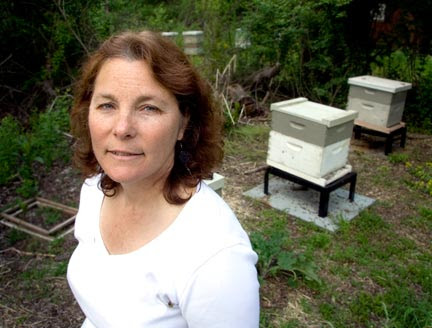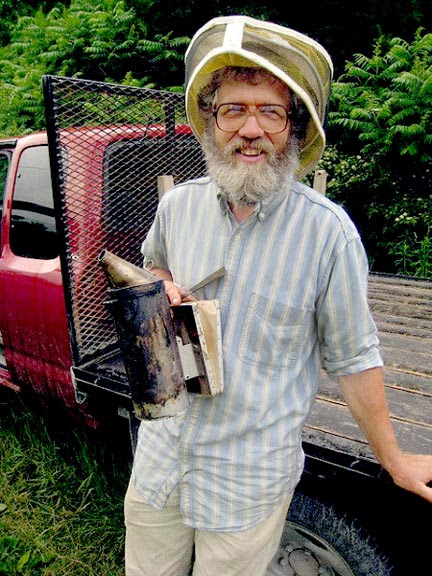Maui Bee Conference Registration Open

Image provided by The Maui Bee Conference.
The Maui Bee Conference, a unique opportunity for the island’s new or experienced beekeepers to connect with professional beekeepers from the US Mainland and other islands, is scheduled for Saturday and Sunday, Jan. 30 and 31.
“Keeping Bees Healthy in a Changing Environment” will feature bee experts Diana Sammataro, Ph.D.; Kirk Webster; Maryann Frazier; Jim Frazier, Ph.D.; Paul Apao; and Bonnie Morse.
The event is being sponsored by Hale Akua Garden Farm in Ha‘ikū.
The conference fee includes lunches and the opportunity to select from 15 individual workshops offered. An optional visit to Maui Queen Bee Company apiary on Feb. 1 is included.
An optional introductory evening is scheduled for Friday, Jan. 29, from 6 to 9 p.m. On Saturday, the conference will run from 9 a.m. to 5 p.m.; Sunday, from 9 a.m. to 4 p.m.
Optional Friday introductory evening with most of the presenters and other attendees is $25 per person. Make reservations to attend when registering.
An optional presentation Saturday evening by Jim Frazier, “Chemicals in a Bee’s Life: the good, the bad, and the amazing,” will begin at 5:30 p.m., followed by pūpū, beverages and an opportunity to socialize with the speakers and other participants. The fee is $45 per person. Make reservations for this presentation when registering.
Workshop topics will include hands-on hive workshops including hive inspections, making nucs, small-scale queen rearing, identifying pests and diseases, small hive beetle control, Varroa mites, beekeeping equipment, monitoring and record keeping, bee microbes, nosema ceranae, effects of fungicides, organizing local groups for support and continuing education, soap making and more.
Speakers
Paul Apao, owner of Maui Queen Bee Company

Jim Frazier. Image provided by The Maui Bee Conference.
Jim Frazier received his bachelor’s degree and Ph.D. from the Ohio State University. He joined Mississippi State University as an insect physiologist in 1970 where he taught courses in insect physiology, and biochemistry and insect behavior. He supervised graduate students and research in the areas of insect behavior and chemical senses. Frazier joined the DuPont Company’s Agricultural Products Department as a senior scientist in 1981, where he conducted research on insect antifeedants. He joined Penn State’s Department of Entomology as head of the department in 1989 for 10 years, helping to transform the department into one of the leading departments of entomology in the US. For the last seven years, he has conducted research on the sub-lethal impacts of pesticides on honey bees together with his wife, Maryann Frazier, and Dr. Chris Mullin. Frazier retired in June 2015 and is now professor emeritus, enjoying his three grandchildren in Florida and the farm life in Mt. Union, Pennsylvaniz.

Maryann Frazier. Image provided by The Maui Bee Conference.
Maryann Frazier received her B.S. in agriculture education from Penn State University in 1980. In 1983, she completed a Masters of Agriculture in Entomology, specializing in apiculture. She has worked as the assistant state apiary inspector in Maryland and for two years as a beekeeping specialist in Sudan and later in Central America. For the past 25 years she has held the position of senior extension associate in the Department of Entomology at Penn State and is responsible for honey bee extension throughout the state and cooperatively across the Mid-Atlantic region. She is working collaboratively with other members of PSU Department of Entomology to understand how pesticides are impacting honey bees and other pollinators. In addition she is working with a team of US and Kenyan researchers to understand the impacts of newly introduced Varroa mites on East African honey bee subspecies and helping Kenyan beekeepers become more productive. The Fraziers, on the front lines analyzing bee hives for pesticide residues, birthed an entire new body of work and discoveries.

Bonnie Morse. Image provided by The Maui Bee Conference.
Bonnie Morse is the conference organizer and co-owner of Bonnie Bee & Company in San Rafael, California. A bee census survey started in Marin County in 2009 showed higher survival rates with local stock, but small-scale (backyard) beekeepers were having difficulty sourcing enough stock to meet demand, so in 2011, she and her husband, Gary, started the business with the goal with to provide a local source of colonies with queens selected and bred from untreated stock. They also provide local beekeepers with support through classes, private lessons and hive management.

Diana Sammataro. Image provided by The Maui Bee Conference.
Diana Sammataro, Ph.D., co-author of The Beekeeper’s Handbook (4th ed. 2011), began keeping bees in 1972 in Litchfield, Connecticut, setting up a colony in her maternal grandfather’s old bee hive equipment. From then on, she decided that her B.S. in landscape architecture (University of Michigan, Ann Arbor), would not be her career and shifted her attention to honey bees. In 1978, she joined Peace Corps and taught beekeeping in the Philippines for three years. On returning, she worked at the USDA Bee Lab in Madison, Wisconsin. Eventually, she went to work at the A.I. Root Company as bee supply sales manager in Medina, Ohio. In 1991, she was accepted at Ohio State University (Columbus) to study for a Ph.D. In 1995, she worked as a post-doctoral assistant at the Ohio State University Agriculture Research Center in Wooster, Ohio, and in 1998 at the Penn State University bee lab. Early in 2002, she was invited to join the USDA-ARS Carl Hayden Honey Bee Research Center in Tucson AZ. Her work at the lab included research on bee nutrition problems, Varroa control, proteomics of Varroa and current pollination problems.

Kirk Webster. Image provided by The Maui Bee Conference.
Kirk Webster is the owner and operator of Champlain Valley Bees & Queens in Middlebury, Vermont. He produces Russian queens and nucs, as well as honey, and his apiary has been treatment-free since 2002. He uses the natural processes active in nature to maintain his hives without treatment for mites and other pests or pathogens. This humble farmer of bees, with his chemical-free operation, is inspiring a new generation of beekeepers to work with the natural processes of our planet’s environment rather than fight against it.
The conference fee is $235 per person if paid by Jan. 23; $255 per person if paid after Jan. 23. Some partial scholarships available. Contact Bonnie Morse via email for more information.
Check-in time for those flying in and staying at Hale Akua is after noon on Friday, Jan. 29. The Friday evening program will begin at 6 p.m. and will include dinner and an introduction to many of the presenters. Maui residents registered for the conference are welcome to attend as well.
Rooms reservations at Hale Akua Garden Farm can be made by calling (888) 368-5305 or (808) 572-9300 (local). Ask for Doris and mention you are attending the conference. Or email [email protected].
Register online.










